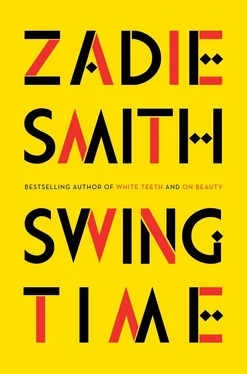“I don’t listen to lectures from you,” I heard her say, as I approached, and when she spotted me, she turned and repeated the point: “I don’t take lectures from him. He wants me to be the last person remaining in this place. No.”
Over by the headmaster’s office, thirty yards from us, a circle of curious teachers who had just finished lunch stood in the shade of the doorway, washing their hands from a tin kettle filled with water and watching the debate.
“We won’t speak now,” whispered Lamin, conscious of this audience, but Hawa in full flow was hard to stop.
“You have been gone one month, is it? Do you know how many others have gone from here in this month? Look for Abdulaye. You won’t see him. Ahmed and Hakim? My nephew Joseph? He is seventeen. Gone! My Uncle Godfrey — no one has seen him. I have his children now. He is gone! He didn’t want to stay and rot here. Back way — all of them.”
“Back way is crazy,” murmured Lamin, but then attempted to be bold: “ Mashala are crazy, too.”
Hawa took a step toward him: he shrank back into himself. As well as being in love with her, I thought, he is a little afraid of her. I understood that — I was a little afraid of her myself.
“And when I go to teachers’ college in September,” she said, jabbing a finger into his chest, “will you still be here, Lamin? Or do you have somewhere else to be? Will you still be here?” Lamin looked over at me, a panicked, guilty glance, which Hawa took as confirmation: “No, I did not think so.”
A wheedling tone entered Lamin’s whisper.
“Why not just go to your father? He got your brother the visa. He could get you the same, if you asked. It is not impossible.”
I’d had this thought myself, many times, but had never asked Hawa about it directly — she never seemed to want to speak of her father — and now, seeing her face alive with righteous fury, I was very glad I’d never asked. The circle of teachers burst into chatter like the crowd at a boxing match when a hard punch lands.
“There’s no love between me and him, you should know that. He has his new wife, his new life. Some people can be bought, some people can smile in the face of other people they do not love, just to gain advantage. But I am not like you,” she said, the pronoun landing somewhere between Lamin and me, as she turned and walked away from us both, her long skirt swishing in the sand.
• • •
That afternoon I asked Lamin to come with me to Barra. He said yes but seemed overcome with humiliation. Our cab ride was silent, as was our ferry trip. I needed to change some money, but when we got to the little holes in the wall — where the men sat on high stools behind shutters, counting out huge towers of grubby notes held together by elastic bands — he left me. Lamin had never left me alone anywhere before, not even when I had most wanted him to, and now I discovered how panicked I was by the idea.
“But where will I meet you? Where are you going?”
“I have some errands to run myself, but I will be around, close by, near the ferry. It is fine, just call me. I will be forty minutes.”
Before I had a chance to argue he was gone. I didn’t believe in his errands: he only wanted to be rid of me for a while. But my money-changing took all of two minutes. I wandered around the market, and then, to avoid people calling out to me, I walked beyond the ferry to an old military fort, once a museum, now abandoned, but you could still climb up its fortifications and see the river and the infuriating way the whole of this town had been built with its back to the water, ignoring the river, in a defensive crouch against it, as if the beautiful view of the opposite bank, of the sea and the leaping dolphins, was offensive somehow or surplus to requirements or simply carried the memory of too much pain. I climbed back down and lingered by the ferry, but I still had twenty minutes so I went to the internet café. It was the usual scene: boy after boy with his headset on, saying, “I love you” or “Yes, my baby girl,” while on the screens white women of a certain age waved and blew kisses, almost always British women — judging from their household interiors — and as I stood at the desk, about to pay my twenty-five dalasi for fifteen minutes, I could watch them all simultaneously coming out of their glass-brick showers, or eating at their breakfast bars, or walking around their rockeries or lounging in a swing chair in the conservatory, or just sitting on a sofa, watching telly, their phones or laptops in hand. There was nothing unusual in any of this, I’d seen it many times before, but this particular afternoon, as I put my money on the desk, a crazed, babbling man ran into the place and began weaving in and out of the computers, brandishing a long, carved stick, and the owner of the café abandoned our transaction to chase him round the terminals. The lunatic was incredibly beautiful and tall, like a Masai, and barefoot, wearing a traditional dashiki embroidered with gold thread, though it was torn and dirty, and on top of his dreaded hair perched a baseball cap from a Minnesota golf course. He tapped the young men on their shoulders, once on each side, like a king performing many knighthoods, until the owner managed to grab his cane from him and started beating him with it. And as he was being beaten, he kept talking, in a comically refined English accent, it reminded me of Chalky’s, from all those years ago. “Good sir, do you not know who I am? Do any of you fools know who I am? You poor, poor fools? Do you not even recognize me?”
I left my money on the counter and headed back out to wait in the sun.
Four
When I got back to London I had dinner with my mother, she’d booked a table at Andrew Edmunds, downstairs—“my treat”—but I felt oppressed by the dark green walls and confused by the surreptitious glances of the other diners, and then she unclenched my right hand from its death grip on a phone and said: “Look at this. Look what she’s doing to you. No nails and bleeding fingers.” I wondered when my mother started eating in Soho, and why she looked so thin, and where Miriam was. Maybe I would have thought a little more deeply about all of these questions if there had been any space in which to seriously consider them, but that evening my mother was on a talking tear, and most of the meal was taken up with a monologue about London gentrification — addressed as much to the nearby tables as to me — stretching from the usual contemporary complaints back through the years until it became an impromptu history lesson. By the time the main course turned up we’d arrived at the early eighteenth century. The very row of townhouses in which we sat — a backbench MP and a pop star’s personal assistant, eating oysters together — was once the accommodation of joiners and sash makers, bricklayers and carpenters, all of whom had paid a monthly rent which, even when adjusted for inflation, would not presently cover the single oyster I was putting in my mouth. “Working people,” she explained, tipping a Loch Ryan down her throat. “Also radicals, Indians, Jews, runaway Caribbean slaves. Pamphleteers and agitators. Robert Wedderburn! The ‘Blackbirds.’ This was their spot too, right under Westminster’s nose… Nothing like that happens round here now — sometimes I wish it would. Give us all something to work with! Or toward! Or even against…” She reached out to the three-hundred-year-old wood paneling beside her head and gave it a wistful stroke. “The truth is most of my colleagues don’t even remember what the real Left is , and believe me they don’t want to remember. Oh, but once upon a time it was a real hotbed around here…” She went on in this vein, for a bit too long, as usual, but in thrilling full flow — nearby diners leaned in to catch the scraps of it — and none of it was barbed or directed at me, all her sharp corners had been filed off. The empty oyster shells were taken away. Out of habit I started in on the skin around my cuticles. As long as she is talking about the past, I thought, well then she isn’t asking me about the present or the future, when I’ll stop working for Aimee or have a baby, and avoiding this two-pronged attack had become my first priority whenever I saw her. But she didn’t ask me about Aimee, she didn’t ask me about anything. I thought: she’s reached the center at last, she’s “in power.” Yes, even if she likes to characterize herself as a “thorn in the party’s side,” the fact is she’s at the center of things, finally, and this must be the difference. She had now what she’d wanted and most needed all of her life: respect. Maybe it didn’t even matter to her any more what I did with my life. She didn’t have to take it as a judgment upon her any longer, or on the way she raised me. And though I noticed she wasn’t drinking, I chalked this up, too, to my new version of my mother: mature, sober, self-confident, no longer on the back foot, a success on her own terms.
Читать дальше












